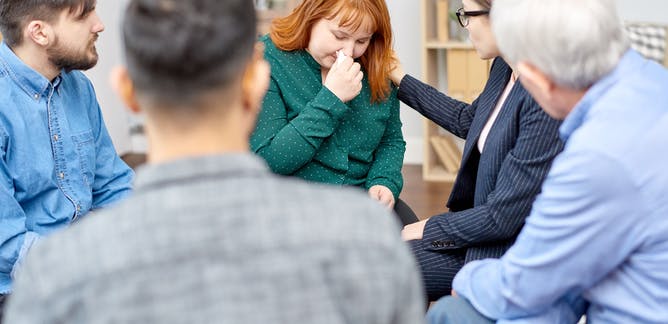How Did Narcotics Anonymous Start?
Founded in Los Angeles in 1953, Narcotics Anonymous was established in response to Alcoholics Anonymous. The founder, Jimmy Kinnon, was a member of Alcoholics Anonymous who regularly attended meetings. He realized there were people struggling with many different substance abuse issues, not just alcohol.
Kinnon, along with the other founding members, started holding their own meetings to discuss a multitude of substance abuse issues, which was the beginning of Narcotics Anonymous. With permission from the Alcoholics Anonymous organization, they adapted the 12-steps and traditions and changed the wording from “alcohol” to “addiction.”
Your path to recovery is waiting
and we’re here to help.
Our admissions specialist are available 24/7 to listen to your story
and get you started with next steps.
When you call our helpline, you will be connected with a caring admissions navigator to discuss your options for treatment.
Who Does Narcotics Anonymous Serve?
Narcotics Anonymous aims to help anyone who wants to overcome their substance addition, regardless of age, gender, race, sexual orientation, or disability status. Just like in Alcoholics Anonymous, anyone is welcome to meetings who wants to become sober. Although family, friends, and loved ones are allowed to attend open meetings, close meetings are reserved only for those struggling with addiction.
NA does not require any financial contribution to attend meetings. Since its start, NA now serves millions of people in 129 countries.
How Does Narcotics Anonymous Work?
When someone considering attending an NA meeting is armed with information, they are more likely to approach the meeting with an open mind. Below, we break down the ins and outs of how NA works.
The Foundation and Structure of NA
According to the “White Booklet” of Narcotics Anonymous, the foundational literature of the organization, “NA is a nonprofit fellowship or society of men and women for whom drugs had become a major problem. We meet regularly to help each other stay clean. … We are not interested in what or how much you used … but only in what you want to do about your problem and how we can help.”
NA provides a nonjudgmental group of support to promote recovery as a community. In meetings, members take turns discussing their experiences and both their challenges and successes of recovery. Just like Alcoholics Anonymous, the strength of the program relies on people being able to relate to and learn from other experiences.
All of the meetings are led by an individual who has successfully recovered through the 12 steps and the 12 traditions of NA. The 12 steps of NA include:



